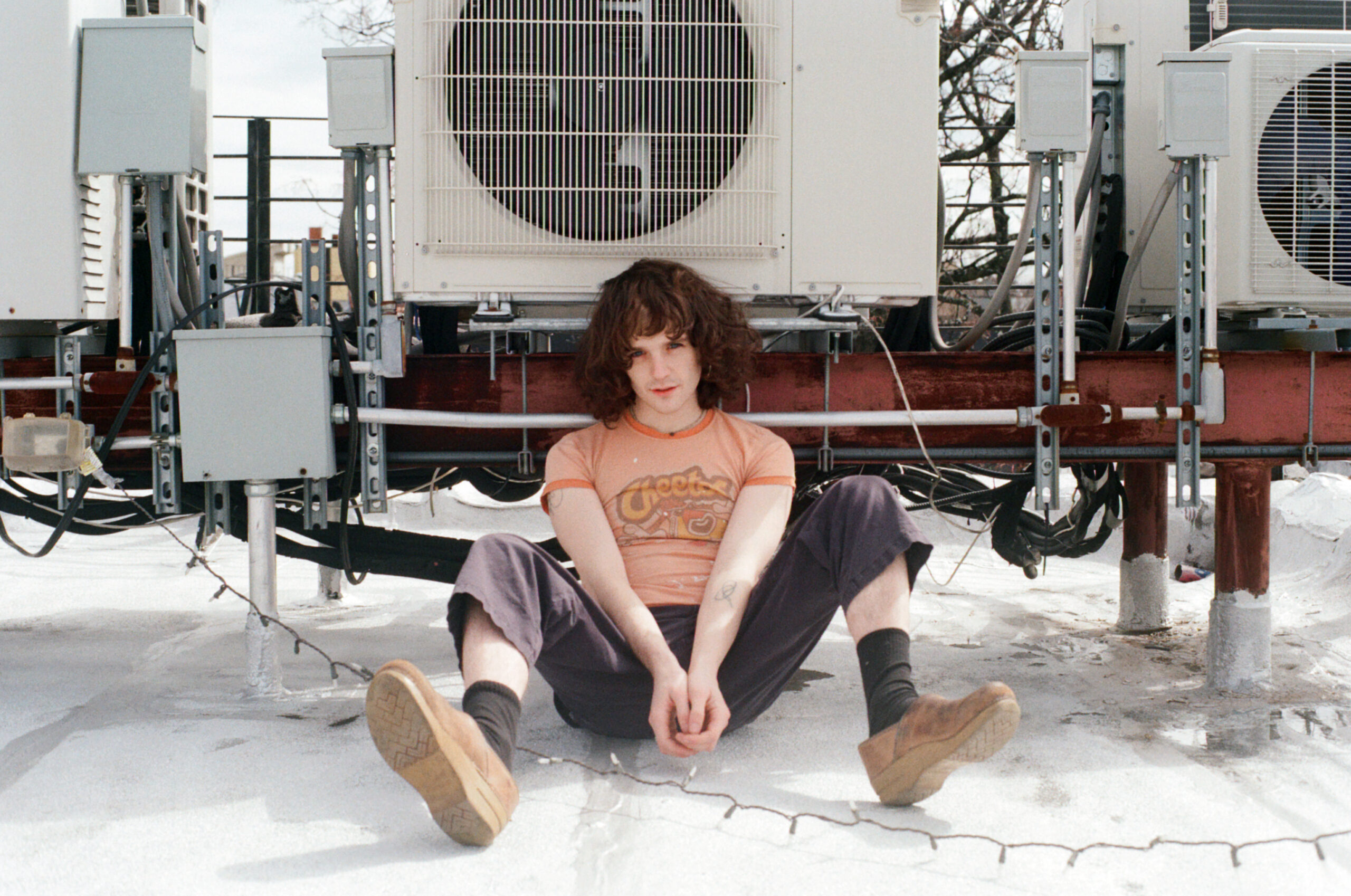The first thing that strikes you about Skirts' debut record Great Big Wild Oak is its cover photo. In the background, a lush, bright green landscape stretches out, rising into a hill that is cut short by the parameters of the photo. Clusters of conifers thrust from the ground -- some tiny pinpricks, others towering over them. In the foreground, a pool of water reflects the vista before it. Everything is still but for the gentle ripples around four swimming figures, tiny and faceless with the distance. It's a beautiful photo, calming, the kind of scene you might envision if you closed your eyes and tried to slow your heart rate in an anxious moment.
The photo was taken by Alex Montenegro, the singer-songwriter behind Skirts, on a trip to Mount Rainier before the record ever existed. "I was on a hike with my best friend, and there were these people swimming in a no swimming pond, and it just looked so magical," she says. She tucked it away, knowing she'd use it for something. It couldn't have found a better fit than Great Big Wild Oak, an indie folk record so gentle and soothing it becomes an idyll of its own.
Montenegro, 26, grew up in the suburbs of Dallas. Her dad was a DJ who showed her how to play a vinyl record when she was barely old enough to talk and raised her on '70s disco. Aged nine, Montenegro was inspired by School Of Rock to ask for her first guitar, and by high school she was discovering indie rock on Tumblr. She was especially excited by the bedroom lo-fi of Flatsound: "I learned, 'This guy's doing this all at home. I should try that too.'" Later came artists like Alex G and Frankie Cosmos, and soon Montenegro started posting her own demos on Tumblr, originally under her surname before switching to the Skirts moniker.
A little later, she was working at a record store in Dallas, where she befriended people who were plugged into Dallas DIY -- until then, she hadn’t known such a thing existed. One new friend was Evan Gordon, an artist who ran a huge house venue called the cOoompound. She started playing and attending shows there and discovered how deep the community ran. "There’s so much local love, and so many people coming out to the shows," she says. "The Texas love is very awesome." Before long, she self-booked her first tour and headed up the East Coast.
Skirts is still based in Dallas, despite Montenegro's complicated relationship with the city. "I used to hate Dallas growing up," Montenegro says. "[But] as I've gotten older, I've developed a love for Texas and Dallas. I love it the most because of all the people I know here, everyone I've met." Yet it can be difficult to ignore that she lives in a deeply red state. "It's hard. It's so discouraging. During the Bernie campaign, a lot of Dallas was really excited and hopeful. And then after it, you're sort of hit with the reality of, oh yeah, Texas would never let something like this happen.
"Texas is such a weird state. I have no idea what’s in store for it for the future. I can talk to my people and spread awareness through my personal communities, but as a whole, there’s only so much you can do."
Great Big Wild Oak has been in the works since 2018. "It felt like a whirlwind, recording and writing all of it," says Montenegro. "It was like a million little parts coming together." Though Skirts is officially a solo project, the record was a full-band effort, and songs were built collaboratively. Skirts' live band members -- Vincent Bui, Victor Bui, and Joshua Luttrull -- were on guitar/pedal steel, bass, and drums respectively. Vincent Bui is also credited as co-producer alongside Montenegro. For its release, Skirts signed to Double Double Whammy, a label that’s been one of Montenegro's favorites since her days at the record store. "[Signing with them] was always a dream, but a dream that was too good to be true," she says. "It's big to me, finally finishing an album and releasing it on one of my favorite labels; there’s a meaning behind it, I like to believe that."
The album's Americana sound was inspired by the Band and Bob Dylan: "Older acts, where you're like, 'Whoa, listen to that pedal steel, or that guitar twang.'" There were contemporary influences, too, among them Montenegro's longtime favorites Fleet Foxes and Bon Iver. The woodwinds on "Easy" were directly inspired by the National track "So Far Around The Bend" -- "There's this one part where you hear all these little flute flutters, and I really wanted that for 'Easy,'" says Montenegro. The instrumentals across the album are warm and mostly traditional -- pedal steel, acoustic guitar, piano -- though it's exciting when electronic textures do show up, like the drum machine on "Easy" or the synth on "Dayspell."
The whole album has an intimate lo-fi feel, though Montenegro laughs at that: "We're so used to my lo-fi lo-fi stuff that we listen to Great Big Wild Oak and we’re like, 'Holy crap, whoa!'" It was all home-recorded, with the exception of "True," an especially Southern-flavored cut driven by piano and seesawing drums. "I wrote that during a band practice and everyone came in, and it just happened like that, like magic," says Montenegro; they ended up in a studio to capture that one.
https://youtube.com/watch?v=epdnm5GJmsE
Some way into the process, COVID hit and the band had to start working remotely. "It became this weird, distant, 'Hey, we’re gonna upload these stems and you see what you wanna do,'" says Montenegro. "It took a really long time to record, just because of the strain of not seeing each other, or really [having] a good plan. I'm definitely to blame for that. I kinda wanted to just go with it and see how things end up, but then it ended up being really hard."
"I don’t know how it would have sounded if we would have done it all in two weeks and then sent it off to mix, versus the two years it took,” she continues. “It made me figure the songs out more. Because I guess I didn’t really know them. I thought I knew them, but I ultimately didn’t until I had worked with them for so long.” Montenegro admits that she’s something of a perfectionist; the pretty piano ballad "Swim" -- out today as the album's third single -- was re-recorded something like five times, and the vocals on "True" took countless takes. "Sometimes I feel like it holds me back, and at a point I did just settle. There became a point where me and Joshua and Vincent had to be like, 'Okay, let's just finish.' Especially because a lot of the takes that we ended up using ended up being one of the first few ones."
Almost all of the album’s lyrics were born out of a heartbreak. Montenegro’s words often call on streaks of imagery -- an oiled puddle, rusty strings, plastic flowers. But there are also moments of sharper focus, that pull you into the immediate shock of heartbreak. This line from "Always" is particularly breathtaking if it catches you on the right day: "I turn left when the light is red/ I hope it's you who slams on the brake."
"[The album’s lyrics] came from a place of comfort, in trying to feel better about a situation that I felt really upset about," she explains. And the album is comforting, from the homespun production to Montenegro's tender vocals. It's intimate without being heavy or demanding on the listener. "They used to feel hard to perform, 'cause I felt like an open book singing them," Montenegro admits. "They feel like a direct look inside my brain sometimes. Sometimes I feel silly or goofy for feeling as intensely as I did. But also, thanks to those feelings, I feel like I've grown so much from where I was when I wrote those songs. I feel more in touch with myself, and like I have a better understanding of what I want or need out of life, and what's important."
Great Big Wild Oak's penultimate track, "Sapling," is the key to that evolution: "I wrote that the day before my birthday, and it was one of the last songs I wrote for the album. It was a super emotional experience, 'cause I let myself be emotionally aware and in touch with this feeling of losing someone - whether it’s romantically or through death." On the second verse, over plucked acoustic guitar, she sings, "Another year has passed, and I don’t feel as old/ As it says on my license, until I am told/ That I have grown into a great big wild oak/ And I'll always be a sapling to my mother." "That lyric linked everything; a similar feeling in every song of not having any control of a situation, just a powerlessness. That song is incredibly special to me 'cause it's like, I feel powerless, but there are people that see that another way." So she surrenders to powerlessness, realizing it may just be the same thing as growth.
A cool breeze blows on Mount Rainier, though the trees barely notice it. You're a great big oak, at the same time as you’re a sapling, and you're the acorn too. In a studio a piano creaks, and in a bedroom a voice cracks. You grow and you're planted anew.

Great Big Wild Oak is out 7/30 on Double Double Whammy. Pre-order it here.






